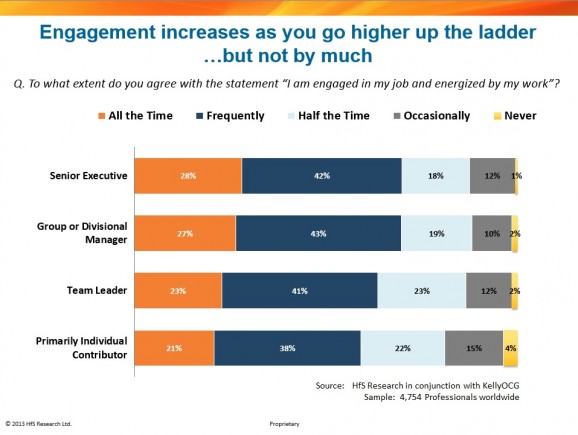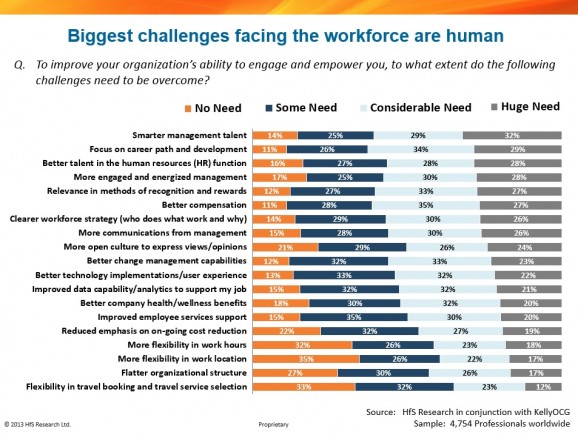And now time for the second installment of Christa Degnan’s Manning’s discussion on HR’s obsession with obsolete processes, and we’ve got some more fascinating data to share from our new employment engagement study of 5,000 worldwide employees, conducted with the support of KellyOCG:
Why senior managers are almost as disengaged as their subordinates
Curious how leadership could be contributing to this poor employee engagement situation, we also looked at engagement by workplace hierarchy. By the nature of being a front-line employee, lower levels of responsibility and autonomy might drive disengagement as they are typically on the receiving end of orders or the bottom of the goal cascading process in the HR process world. (What is it that they say about what runs downhill?)
While we did find higher levels of engagement the higher up the proverbial ladder one goes in an organization, the key take away for us was the difference wasn’t that much. This actually supports another data point near the top of the list of challenges that need to be overcome to improve engagement: #4 is “More engaged and energized management.”
The reality is that companies are simply not investing in their people across the board; even senior leaders report a lack of support to develop new skills and capabilities. The #2 overall challenge to engagement is “Focus on career path and development,” right after “Smarter management talent.”
Get rid of the rank and yank
I would argue in today’s lean, mean virtual global marketplace, the main culprits to these issues is the cut backs in training, including face-to-face travel and events, and the all-too-pervasive “performance rating on the curve” system, which means that for one worker to win another has to lose. In a world where workers may be asked to calibrate colleagues’ performance having never been given the opportunity to even meet in person, the traditional curve approach is demoralizing, demotivating, and downright destructive because it is completely obsolete in the virtual, mobile, social, flexible workplace.
If so much of work today has been outsourced or arranged through contingent workers or specialty statement of work (SOW) consultants, companies should only have their very best people left. With many business models shifting and people assuming multiple roles, there should be more rigorous training and opportunities for real connections in place. And companies should ask: is it fair to compare worker contribution just because they are the same band level? Or a worker in the U.S. to someone in France who legally has twice the time off (and is almost impossible to fire?)
I would also argue that senior executives are disengaged almost as much as the rest of the workforce because they have been the products of these outdated processes and are being asked to perpetuate them. They are also victims because they killed themselves to get and stay at the top of the curve in performance ratings, then too often are rewarded by being asked “to take one for the team” with a “stretch assignment” that has nothing to do with their strengths, interests, family commitments, or their own career aspirations – other than moving up – or staying on the same rung – of the ladder in the business.
Stay tuned for Part 3 (click here to read), where Christa discusses measures enterprises can take to improve the engagement levels of their staff and invest more in humans and less on systems…
Posted in : Business Process Outsourcing (BPO), HfSResearch.com Homepage, HR Outsourcing, HR Strategy, Social Networking, Sourcing Best Practises, sourcing-change, Talent in Sourcing, the-industry-speaks









[…] tuned for Part 2, where we discuss, who and what is to blame and the common sense solutions in front of […]
Christa – this data is a frightening view of what’s happening in the corporate world. Too many managers and staff are simply being worn down by cumbersome processes and leadership’s focus on cost control. People used to take real pride in their work, but I fear too many employees are simply “going through the motions” today. Corporate leaders need to focus on redefining their corporate cultures to drive more motivated behaviours, creating a sense of common purpose and a value associated with their organization that goes beyond simply making money,
Amanda Hare
Amanda – thanks for commenting, can’t agree more – in fact, I’ve bet my career on addressing this issue to drive the change that is desperately needed! BTW a great book that brings some of the other ideas you raise to the fore is Conscious Capitalism by the co-founder of Whole Foods and a Babson professor, puts the employee experience into context of all the stakeholders in successful sustainable businesses.
Looks like the data you present supports intuitive reasoning. Senior management of corporations have made attempts to propagate the theory of we the haves and they (the lower down folks) the have nots. We have all the desirable qualities like dedication, commitment, passion, et al while they have none. It is indeed, a task for us haves to get work out of the have nots in the interest of the organisation and shareholders.
Unfortunately, as humans, we are more alike than different. The basic motivators remain the same. Some of the basic questions to be answered are:
Am I at a suitable position for my skills, experience and preferred variable mix of hours, travel, etc.or can I look for a better position?
What is in it for me?
How much control do I have over my success / failure?
Including a couple of links to writings on people behaviour in corporates:
http://darkofficehumour.wordpress.com/2011/12/06/misusing-company-resources-2-meeting-rescheduled-finally/
http://darkofficehumour.wordpress.com/2011/11/30/for-your-own-good-withdrawal-of-transport-facility/
[…] And now for the third and final installment in Christa Degnan Manning’s discussion on HR’s obsession with obsolete processes… […]
[…] Danning wraps her hard-hitting series of posts based on HfS research data on the stagnation that is too often prevalent in HR departments. Two resonant points: the survey data shows that tech solutions are overrated, and the potential of personal development and leadership growth is underrated. Also, the problems Manning analyzed are not limited to the rank-and-file – senior managers are almost as disengaged as their subordinates. […]
Change is afoot: “@WSJ: Microsoft is killing “stack ranking,” its sometimes loathed employee-review system. http://on.wsj.com/HPJ4aA ”
Interesting! I would’ve wanted to answer this survey and be involved. Knowing that there are still professionals who ‘never’ feel engaged with their jobs, it absolutely means that companies should do something about it. As I’ve read in one of your posts, companies should invest in their people first before systems. These data would be very useful for start-ups as well.